SWAMI VIVEKANANDA'S.......KASHMIR POEMS
|
SWAMI VIVEKANANDA .......
KASHMIR POEMS Chander M. Bhat |
|
|---|---|
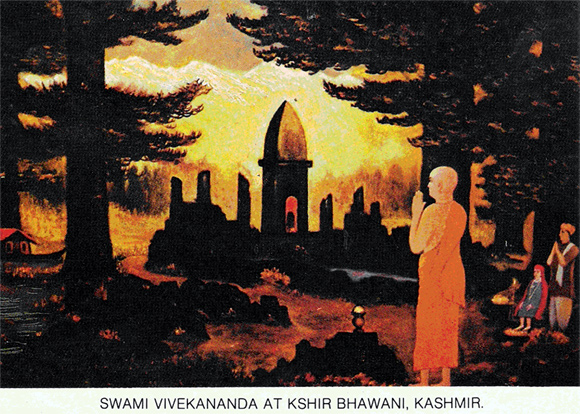 |
|
|
Swami Vivekananda is generally known as a saint, a patriot, and a lover of humanity. Very few outside the circle of his devotees and admirers know him as a poet. A saint is sometimes an artist as much. Belonging as his thoughts do to a higher plane, the aesthetic sense of a saint and seer is spontaneously developed and that sense may be expressed through various channels. So we find that some of the saints were great musicians, some were great poets, and so on.
Swami Vivekananda wrote 33 poems including two translations, eight in Bengali, four in Sanskrit and one in Hindi. From among these poems- only three- “To the Awakened India”, “To the Fourth of July” and “Kali the Mother” will be the concern of this paper. These poems form a group by themselves as they were all written in Kashmir during his visit in the year 1898. |
|
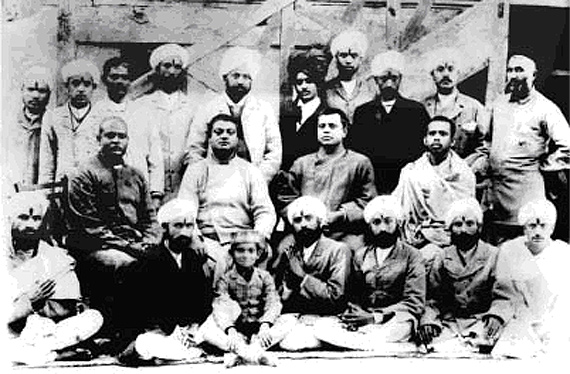 Sitting on chairs, left to right: Swamis Sadananda, Vivekananda, Niranjanananda, and Dhirananda.[Kashmir, 1897] |
|
|
Though Swami Vivekananda wrote these poems in different circumstances and for different purposes, an undercurrent of Swamiji’s passionate concern for the political bondage of his country and a deeply embedded sense of the need for preparing India for political freedom are perceptible to a careful reader. The poems under discussion have oblique reference to India’s struggle to seek an identity.
“TO THE AWAKENED INDIA” This poem was composed by Swami Vivekananda at Srinagar (Kashmir) in June 1898 and was written to the journal Prabuddha Bharata or Awakened India, in August 1898, when the journal was transferred from Madras to Almora, Himalayas, into the hands of the Brotherhood founded by Swami Vivekananda. Sister Nivedita writes: “The Swami always had a special love for this paper, as the beautiful name he had given it indicate… Day after day, he would talk of the forthcoming first number, under the new editorship of Swami Swarupananda. And one afternoon, he brought to us, as we sat together, a paper, on which he said, he had “tried to write a letter, but it would come this way”.
|
|
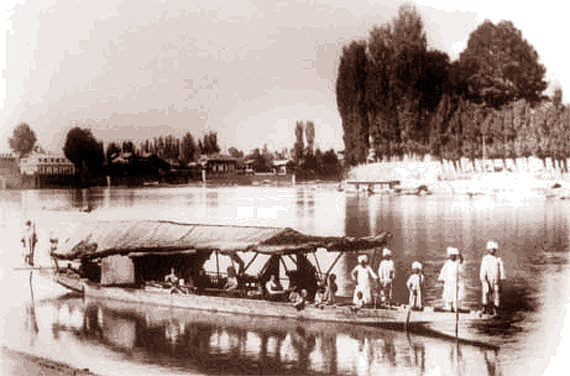 Swami Vivekananda on a houseboat in Kashmir, 1898 |
|
| Read at one level, the title of the poem may point to the name of the journal, and at another, it may be taken as a reference to the resurgence of “the sleeping Leviathan i.e. India.
“Once more awake! When we reach the last stanza, the poet extends his meaning. “Awake, arise, and dream no more”. He exhorts the world to dream truer dreams, which are eternal love and service free. The poet in fact addresses the motherland. Here he says: “The Mother that resides in all as power and Life…Makes of one the World…and shows the One in All”. Vivekananda wrote this poem on the 4th of July 1898, when he was traveling with some of his western disciples in Kashmir. He had a tailor make a replica of the American flag together with branches of evergreen. It was nailed to the prow of the dining room boat, where a tea was arranged. As part of a ‘domestic conspiracy’ for the celebration of the day…the anniversary of the American Declaration of Independence…he composed this poem and told the disciples accompanying him to read the poem aloud at the time of breakfast. Mrs. Ole Bull, one of the disciples of Swamiji, preserved this poem. It is significant to note that Swami Vivekananda gave up his mortal frame on the same day four years later.
Behold, the dark clouds melt away “It is not the actual Fourth of July that is portrayed, but a blending of the concrete and the abstract responses to a national event and to eternal concepts,” says Carebanu Cooper. Image and idea, symbol and thought are integrated in the poem. Vivekananda uses two words “Liberty” and “Freedom” in this poem. In a letter written to Mrs. Bose, Vivekananda defines “liberty” as “full right to their body, wealth etc” and “freedom” as “advance towards Mukti” in all matters. “KALI THE MOTHER” This poem was written or forced itself into writing, when, during the days of pilgrimage to Kshir Bhawani (Kashmir) in 1898; the Swami was in such a high spiritual state that it seemed indeed as if his physical frame could not bear it for long.
Sister Nivedita who accompanied the Swami on that pilgrimage says: ‘His brain was teeming with thoughts, he said one day, and his fingers would not rest till they were written down. It was that same evening that he came back to our house-boat from some expedition, and found waiting for us, where he had called and left them, his manuscript lines on Kali the Mother. Writing in a fever of inspiration, he had fallen on the floor, when he had finished…as we learnt afterwards…exhausted with his own intensity.’ The stars are blotted out, This poem glorifies the power behind manifestation. The Swami worships the terrible here. The universe provides a stage for the enactment of the Mother’s frenzied dance. According to Ms. Cooper, “Kali destroys those traits in man that hinder him from an awareness of his divinity”. The supreme must be thought of either as Infinite Being or as Infinite Power. Here the poet sees Her as Infinite Power.
“Kali the Mother” had inspired great patriots like Sri Aurobindo and Netaji Subhash Chandra Bose. It served as a model for Sri Aurobindo’s Bhawani Mandir manifesto. About the primordial energy personified in the Mother worship, Sri Aurobindo says: “The Shakti we call India. Bhawani Bharati is the living unity of the Shaktis of three hundred million people; but she is inactive, imprisoned in the magic circle of Tamas, the self-indulgent inertia and ignorance of her sons. Strength can only be created by drawing it from the eternal and inexhaustible reservoirs of the spirit, from the Adya-Shakti of the Eternal which is the fountain of all new existence”. Dr. Radhakrishnan says that Vivekananda give “articulation and voice to that eternal spirit of India”.
|
|
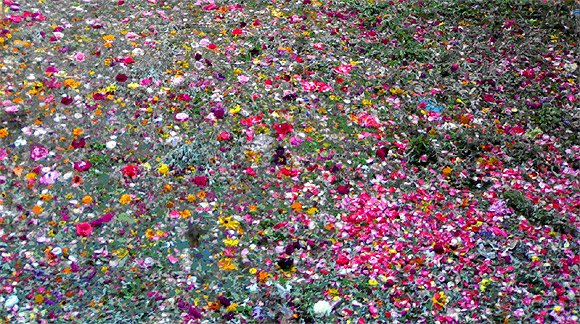 Holy Spring filled with flowers at Kshir Bhawani, Tullamulla, Kashmir |
|
| That Vivekananda always considered Mother worship as a means of uplift India and Indians is clear from his statement that follow: “I can only say, every blow I had in this life, every pang, will become joyful sacrifice if Mother becomes propitious to India once more”. “But saviors, books, prophets, ceremonials etc. have their places. They may help many, as Kali worship helps me in my secular work”. Without Shakti (Power) there is no regeneration for the world. Why is it that out country is the weakest and the most backward of all countries…because Shakti is held in dishonour there?” Swami Vivekananda had a clear vision of the resurgent India. He was himself the harbinger of India’s renaissance. He had declared that India is awakening after a long period of slumber, which he described as the longest night in India’s history. He had predicted that no power on earth can stop India from emerging as a strong and powerful country and occupying her rightful place among the comity of nations. It is only such an India that can effectively preach the message of universality and tolerance to the rest of the world. It is the mission of India to do that. |
|
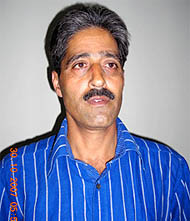 *Chander M. Bhat Born on March 20th 1960 in village Murran, Pulwama, Kashmir. Poems written in English published in various newspapers and magazines. Articles on various subjects also stand published. Two book in English “MURRAN …MY VILLAGE” and “OCEAN BY DROPS” stands published. Research papers on “Vitasta…. The Sacred River of Kashmir” and “The Splendour that is Amarnath” stand published in leading magazines. A book “Jammu and Kashmir…Origin and History” underway. *Chander M. Bhat Born on March 20th 1960 in village Murran, Pulwama, Kashmir. Poems written in English published in various newspapers and magazines. Articles on various subjects also stand published. Two book in English “MURRAN …MY VILLAGE” and “OCEAN BY DROPS” stands published. Research papers on “Vitasta…. The Sacred River of Kashmir” and “The Splendour that is Amarnath” stand published in leading magazines. A book “Jammu and Kashmir…Origin and History” underway. Presently working as Assistant Supdt. Posts and posted as Asstt Supdt. Posts (HQ), Udhampur,. |
|
| Copyrights © 2007 Shehjar online and KashmirGroup.com . Any content, including but not limited to text, software, music, sound, photographs, video, graphics or other material contained may not be modified, copied, reproduced, republished, uploaded, posted, or distributed in any form or context without written permission. Terms & Conditions. The views expressed are solely the author's and not necessarily the views of Shehjar or its owners. Content and posts from such authors are provided "AS IS", with no warranties, and confer no rights. The material and information provided iare for general information only and should not, in any respect, be relied on as professional advice. Neither Shehjar.kashmirgroup.com nor kashmirgroup.com represent or endorse the accuracy or reliability of any advice, opinion, statement, or other information displayed, uploaded, or distributed through the Service by any user, information provider or any other person or entity. You acknowledge that any reliance upon any such opinion, advice, statement, memorandum, or information shall be at your sole risk. |
